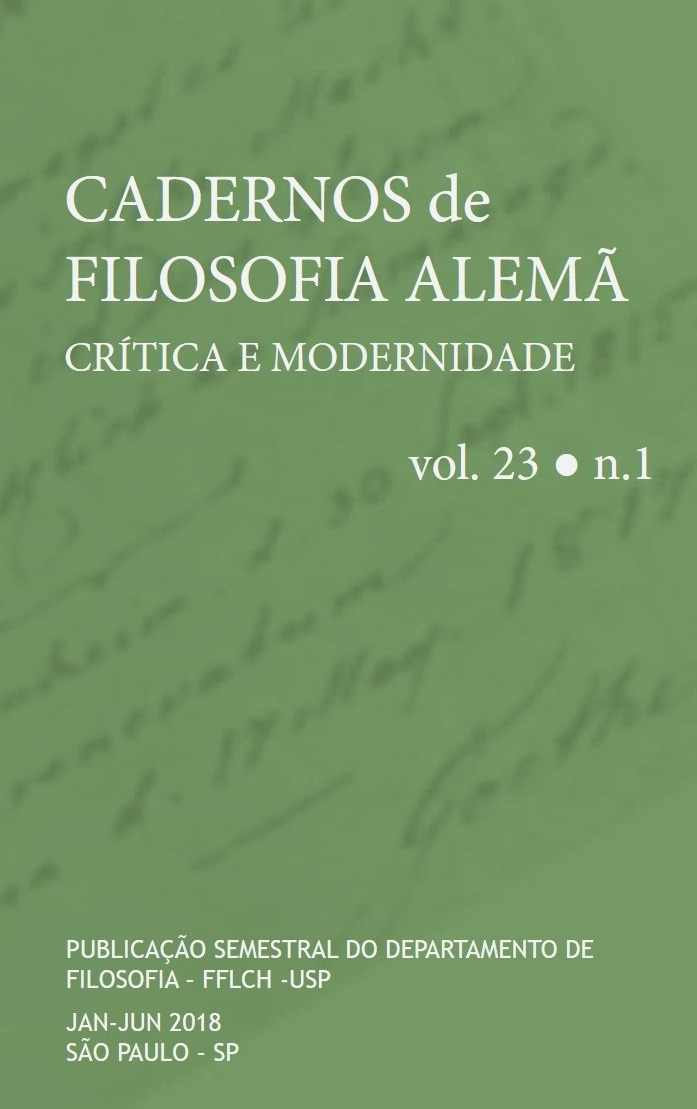Theory of modernity and aesthetic form in Walter Benjamin’s distinction between tragedy and Trauerspiel
DOI:
https://doi.org/10.11606/issn.2318-9800.v23i1p95-106Keywords:
modernity, secularization, Walter Benjamin, Trauerspiel, tragedyAbstract
The aim of this work is to show that Walter Benjamin’s distinction between tragedy and Trauerspiel contains not only an interpretation of the particularities of each dramatic form, but that the distinction itself constitutes one the fundaments of his theory of modernity. Through a comparison between Benjamin’s theory of tragedy, the reflection on tragedy from romantics and from the beginning of 20th century, it will be analyzed how the concepts of modernity and tragedy are systematically intertwined in Benjamin’s work, both from a genealogical and from a systematic point of view.
Downloads
References
Benjamin, W. (1997). Gesammelte Briefe. Fráncfort del Meno: Suhrkamp.
____________. (2005). Libro de los Pasajes. Madrid: Akal.
____________. (2006). Obras. Libro I. Vol 1. Madrid: Abada.
____________. (2007). Obras Libro II. Vol. 1. Madrid: Abada.
Blumenberg, H. (2008). La Legitimación de la Edad Moderna. Valencia: Pre-Textos.
Caygill H. (1994). Walter Benjamin’s Philosophy. Destruction and Experience. Londres / Nueva York: Routledge.
Cohen, H. (1982). “Ästhetik des reinen Gefühls”. En: Werke, Tomo 2, Hildesheim/ Nueva York: Georg Olms Verlag.
Fenves, P. (2001). Arresting Language. From Leibniz to Benjamin. Stanford: Stanford University Press.
Ferber, I. (2013). Philosophy and Melancholy. Stanford: Stanford University Press.
Hegel, W. (1907). “Diferencia entre la imaginación religiosa griega y la religión positiva cristiana”. En: Nohl, H. (ed.). Hegels theologische Frühschriften. Tubinga: J. C. B. Mohr.
Heidegger, M. (1978). Gesamtausgabe Band I, Frühe Schriften. Fráncfort del Meno: Vittorio Klostermann, pp. 413-433.
Koselleck, R. (2004). historia/Historia. Madrid: Trotta.
Menke, B. (2010). Das Trauerspiel-Buch. Der Souverän – das Trauerspiel – Konstellationen – Ruinen. Bielefeld: Transkript.
Menke, C. (2001). Conflicto ético y juego estético. Acerca del lugar histórico filosófico de la tragedia en Hegel y Nietzsche. Traducción de Gerard Vilar. En: Enrahonar, 32/33, pp. 203-222.
Schlegel, F. (2005). Diálogo sobre la poesía. Traducción de Laura Carugatti. Buenos Aires: Biblos.
Simmel, G. (1916). Das Problem der historischen Zeit. Berlín: Reuther&Reichard.
Weber, M. (2010). “La ciencia como vocación”. En: Obras Selectas. Buenos Aires: Distal.
Weidner, D. (2014). “Säkularisierung”. En: Weidner, D.; Buch, R. (eds.). Blumenberg lesen: Ein Glossar. Berlín: Suhrkamp.
Downloads
Published
Issue
Section
License
Information and conceptions on the texts are complete responsibility of the authors.
All the articles submitted before July 5th 2018 and those published after July 2021 are licensed under a CC BY-NC-ND license – except those published between the aforementioned dates, which are under the CC BY-NC-SA license. The permission for the translation of the material published under the license CC BY-NC-ND by third parts can be obtained with the consent of the author.
Open access policies - Diadorim
Rules applied before July 5th 2018:
Presenting a submission to our Editorial Board implies granting priority of publication for “Cadernos de filosofia alemã”, as well as transferring the copyright of texts (once published), which will be reproduced only with the manifest authorization of the editors. Authors keep the right to reuse the texts published in future editions of their work, without paying any fees to "Cadernos”. We will not grant the permission to re-edit or translate the texts for third parts without agreement of the author.


